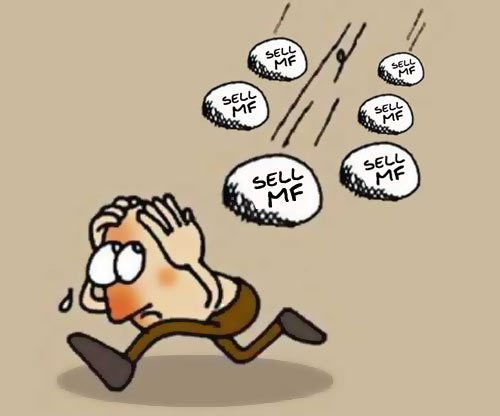Photographs: Uttam Ghosh/Rediff.com Morningstar.in
Some situations almost demand that you hit the sell button.
While most of us can agree on what to look for when buying a fund -- good risk-adjusted returns, long manager tenure, and so forth -- we often part ways on when to sell. None of us want to be one of those investors who undermines his/her returns by buying and selling at the wrong time.
Yet some situations almost demand that we hit the sell button. Here are those:
1. The fund loses more than it should
Suppose a bond fund loses more than 23 per cent in a year in which its average peers suffer a much slimmer loss. That was the case with BlackRock World Income in 1998, a multi sector-bond fund in the US that made a big bet on emerging-markets debt in general and Russian debt in particular.
Shareholders who expected boring bond performance should have sold.
2. The fund gains more than it should
This might sound illogical -- after all, who complains about great returns? But if your "moderate" balanced fund posts a 60 per cent return when its average peer is up 10 per cent, maybe you don't own what you think you do.
When to sell a mutual fund? 6 SIGNS
Photographs: Uttam Ghosh/Rediff.com
3. The fund changes its strategy
Presumably, you buy a small-cap fund because you want exposure to small-cap stocks.
If the manager suddenly starts buying large-cap stocks, you may have a problem.
After all, you may already have a large-cap fund in your portfolio. Be careful in how you define a change in style, though.
Sometimes a manager's stocks and habits will change, even though her/his underlying strategy hasn't.
Sometimes, a fund may have migrated from a small-cap to the mid-cap area of the style box only because the underlying small-cap stocks may have moved into the mid-cap zone.
4. The fund underperforms for a long period
While one year of underperformance may be nothing to worry about, two or three ugly years can get frustrating. The urge to sell intensifies.
Before pulling the trigger, be sure you're comparing your underperformer to an appropriate benchmark, such as its Morningstar category peers or a suitable index. Before you pass judgment, make sure the manager or strategy hasn't changed.
When to sell a mutual fund? 6 SIGNS
Photographs: Uttam Ghosh/Rediff.com
5. Your goals change
You don't invest to win some imaginary race, but to meet your financial goals.
As your goals change, your funds should change as well. Suppose you start investing in a balanced fund with the goal of buying a house within the next five years. If you get married and your spouse already owns a house, you may decide to use that money for retirement instead. In that case, you might ditch the balanced fund for a pure stock fund.
Your goal and the time until you draw on your investments have changed.
6. You can’t take it anymore
The point of investing is meeting financial goals, not developing mental stress. If your fund is so volatile that not even the vision of your brand new house calms you down, then by all means sell -- as long as you'd never buy the fund or a fund like it again.
The moral: Know your funds, know yourself, and never make the same mistake twice.





Comment
article